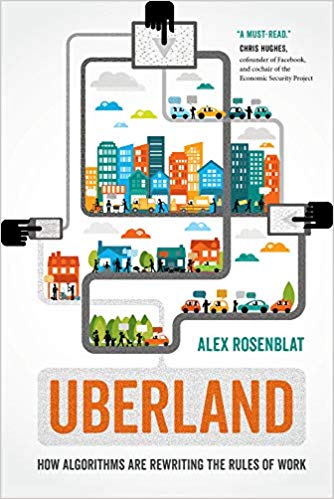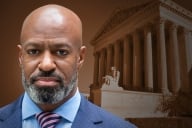You have /5 articles left.
Sign up for a free account or log in.
 Uberland: How Algorithms Are Rewriting the Rules of Work by Alex Rosenblat
Uberland: How Algorithms Are Rewriting the Rules of Work by Alex Rosenblat
Published in October of 2018
There are few defenders across higher ed of the culture of Uber.
There are many in higher ed, whoever, who admire the idea of Uber.
We like the idea of technology-enabled innovation. We appreciate that Uber has created transportation as a service. We think that maybe higher ed as something to learn from Uber.
The reality of Uber, as we learn in Uberland, is disturbing.
Alex Rosenblat is a technology ethnographer. Her method for research Uberland was to take lots of rides from Uber drivers, across many cities, and have conversations with the drivers.
Rosenblat mostly lets the Uber drivers tell their own stories. It is through the experiences of the drivers that we begin to understand the meaning of Uber, and the new Uberized economy of contingent labor.
What do we learn from reading Uberland?
Mostly, we learn that driving for Uber is not a good job. Some drivers call it a “good, bad job.” But it is a lousy job in most ways.
Driving for Uber is not an entree into a middle-class life. The money an Uber driver makes from fares must also cover all the expenses. These expenses include the cost of the car, gas, and wear and tear.
Earning a living wage through driving for Uber is exceedingly difficult. The vast majority of Uber drivers are part-time. Uber driving is a side hustle for most.
Low wages and difficult working conditions result in very high rates of turnover. There are low barriers to start driving for Uber, and a great deal of churn.
The large numbers of people who start driving for Uber part-time have the effect of driving down wages for the relatively small number of full-time Uber drivers. Uber keeps fares low to increase rider demand. This demand is often met by new drivers, drivers who are likely not to be working for Uber for much longer.
Uberland provides a fascinating window into a new model of employment. In this model, Uber drivers are not employees but customers. Both drivers and riders are participants in the Uber platform. They are both consumers of the app.
Uber drivers have no more employee rights than Uber riders. They have no employee benefits, no rights, and no protections.
Rosenblat is a critic of Uber, but Uberland is no anti-Uber screed. She appreciates the benefits that Uber brings to the transportation system of the cities and towns in which it operates.
For many drivers, Uber offers opportunities to earn incomes that are commensurate with other lower-paid work such as retail and food service, but with greater flexibility.
What Rosenblat wants us to see is that Uber is re-writing the norms of employment in a way that benefit mostly a small class of workers. Those who develop and refine the technology behind Uber are the winners in an Uberized economy.
The benefits of the Uber platform extend only partially to the drivers, while these same drivers absorb almost all of the costs.
The parallels between Uber drivers and contingent faculty are hard to ignore. Higher education as an industry does much the same as Uber when it relies on contingent faculty to provide the majority of the instructional labor.
In the case of Uber, it is a bit easier to figure out what our response should be. We should tip generously on each Uber ride. We wouldn’t think of leaving anything less than a 20 percent tip for the server in a restaurant. A 20 percent tip should be standard for every Uber ride.
But is tipping generously enough of a response? Are there other options?
This is where those who only ride Lyft may want to take a pause as well. Lyft may be a bit more driver friendly than Uber, but its business model is the same as Uber's.
For higher ed, it is less clear what actions we can take as individuals to stand against a system that treats so many educators so poorly. How do we stand with contingent faculty when we are not in charge of setting the terms of employment?
As someone who believes that technology is a positive force for driving change, I’ll admit to being deeply disturbed by reading Uberland.
Is there a similar worrying story that we should be telling about the overlay of Silicon Valley tech culture on higher education?
Would higher ed come out much better than Uber if Rosenblat had spent her time hanging out with contingent faculty instead of Uber drivers?
How do you make sense of Uber through your higher ed eyes?
What are you reading?








